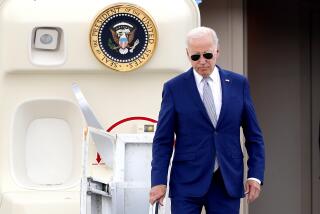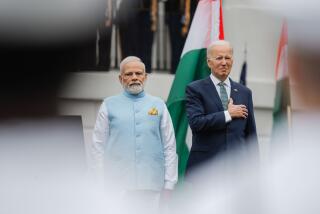Clinton Fails to Move Pakistan on Peace Issues
- Share via
ISLAMABAD, Pakistan — President Clinton met for more than an hour and a half Saturday with Pakistani Gen. Pervez Musharraf, but he failed to win any concessions from this nation’s military ruler that might defuse the volatile standoff in South Asia.
Senior officials said Clinton secured no promises from Musharraf to stop guerrillas based in Pakistan from crossing into the Indian region of Kashmir, where a violent insurgency has brought the two countries to the brink of open conflict.
When he departed Islamabad, the Pakistani capital, Saturday afternoon--after a visit that lasted less than seven hours--Clinton thus left the South Asian region much as he found it when he arrived a week ago, with the two nuclear-armed rivals embroiled in their worst relations in a quarter of a century.
“We heard no new assurances from the general,” a senior Clinton administration official said in Islamabad.
Musharraf, who seized power from a democratically elected government last October, said he and Clinton agreed that tensions in South Asia have to cool down. But he gave the president no indication of when he plans to return Pakistan to democratic rule.
Musharraf also declined to moderate the country’s nuclear weapons program. He refused to rule out the death penalty for the man he overthrew, former Prime Minister Nawaz Sharif. And he indicated that he is in no mood for compromise with India.
“I would not jump to the impulsive act of picking up the telephone to talk to the Indian prime minister,” Musharraf said of Atal Behari Vajpayee. “They have to reduce atrocities in Kashmir.”
In a live, 15-minute address broadcast to the Pakistani people, Clinton suggested that the country will find itself increasingly isolated if it supports aggressive policies against India. He also implored Pakistanis to return to democratic rule--in effect urging them to reject their military ruler.
“This era does not reward people who struggle in vain to redraw borders with blood,” Clinton said in his televised address. “There is no military solution to Kashmir.”
The tense ending to Clinton’s weeklong tour of South Asia seemed to affirm a dramatic realignment by the U.S. government toward India, seen as a burgeoning democracy full of promise, and away from Pakistan, a longtime ally beset by crisis. While Clinton invited the Indian prime minister to visit Washington later this year, he gave no indication that he and Musharraf will meet again.
Senior officials in the Clinton administration did say they hoped that the president’s visit will pay off down the road, in part because Clinton and Musharraf developed a rapport during their meeting. Administration officials said that Clinton found the general easy to deal with, while Musharraf said that he and the president got along so well that they chatted about their golf games.
“He told me he was a 12-handicap golfer, and I told him I would like to challenge him on that,” said Musharraf, who had changed out of his military uniform and into a white tunic for the visit.
During two sessions, which included lunch, Clinton and Musharraf managed to agree on a few points: The general promised not to export Pakistan’s nuclear technology. He pledged to take up the issue of suspected terrorist mastermind Osama bin Laden with the leaders of Afghanistan, where Bin Laden, a Saudi exile, has taken sanctuary. And he promised to look into the fate of Donald Hutchings, an American hiker kidnapped by pro-Kashmiri militants in the Himalayan region in 1995.
“There were many areas where they disagreed . . . but nobody stormed out in protest,” a senior administration official said. “We didn’t expect to come here and in an hour persuade the leadership here of the wisdom of all our positions.”
For his part, Musharraf said he was satisfied that Clinton left with a better understanding of the Kashmir problem, the source of two wars between India and Pakistan since 1947. The general also reaffirmed his offer to hold talks with the Indian leadership over Kashmir. India’s leaders have refused to engage in such discussions until the Pakistani government stops supporting what they say is “terrorism” in their country.
“Pakistan is ready for a dialogue anywhere, at any time and at any level,” the general said.
On the central issue of Kashmir, however, the two men seemed to talk past one another. Clinton asked the leaders of both India and Pakistan to refrain from cross-border attacks and to restart their stalled dialogue. But as his plane left Islamabad, the prospects for either eventuality seemed remote.
The general said he gave no assurance to Clinton that he will try to stop the infiltration of guerrillas into Indian Kashmir. Musharraf said that, although his government does not support the guerrillas, it probably would be unable to police its borders. Clinton said last week that elements of the Pakistani army have been fomenting terrorism in India.
Musharraf indicated as well that there will be no change in his Kashmir policy until the Indians take the first step.
The Indians “need to stop the human rights violations. They need to stop crossing the Line of Control,” the general said, referring to the two countries’ disputed border in Kashmir. “Then we could use our influence to moderate the activities of the freedom fighters.”
Clinton decided to visit Pakistan in part to help ease the nation’s rapidly deteriorating relations with India. Fighting along the two countries’ disputed 450-mile border in Kashmir has raged through the winter--giving rise to fears that a fourth Indo-Pakistani war could break out when the Himalayan snow melts this spring. The Kashmir dispute, once a local affair, became a global concern two years ago, when India and Pakistan conducted nuclear tests.
After his five-day visit to India, Clinton arrived here Saturday morning from Bombay amid unprecedented security precautions--a chilling manifestation of Washington’s belief that many terrorist groups operate out of Pakistan.
A decoy blue-and-white Air Force One landed first at Chaklala Air Force base here, giving every indication that Clinton was inside. The door came down, but only Secret Service agents and White House aides got off the plane.
Only then did a second plane--bearing no markings--swoop in with the president aboard. As Clinton emerged, agents quickly converged around him. Clinton spoke briefly with Pakistani Foreign Minister Abdus Sattar and then got into one of about half a dozen identical limousines. The limousines joined a motorcade as it glided through a city eerily devoid of traffic or pedestrians.
“It was not the usual lineup,” a Secret Service agent said of the decoy maneuvers.
As he rode into downtown Islamabad, Clinton passed armed troops at every turn, along with several huge banners proclaiming the Kashmir cause: “Equal Rights For All--Why Not Kashmiris?” and “Kashmiri Children Too Have a Right to Live.”
Clinton’s talks with Musharraf underscored the rapid rate at which U.S. relations with India and Pakistan are changing. Clinton declared repeatedly last week that a new era has begun between the U.S. and India, but America’s relations with Pakistan have come under serious strain.
First, there was Pakistan’s nuclear test in 1998, which prompted the U.S. to impose economic sanctions on the country--as it had on India when that country exploded its own nuclear devices. Then, last summer, Pakistani troops tried to seize a wide swath of Indian territory in Kashmir, a move that led to heavy fighting.
In October, Musharraf, thought to be the architect of the military adventure against India, toppled the democratically elected government. And throughout this period, U.S. officials have been concerned about the presence of extremist groups on Pakistani soil. When a U.S. diplomat asked Musharraf earlier this year to crack down on the group Harkat Moujahedeen, which is believed to have been involved in the recent hijacking of an Indian Airlines passenger jet, the request was rebuffed.
“I believe our friendship can still be a force for tolerance and understanding throughout the world,” Clinton said in his televised address. “I hope you will be able to meet the difficult challenges we have discussed today.
“If you do not,” he continued, “there is a danger that Pakistan may grow even more isolated, draining even more resources away from the needs of its people, moving even closer to a conflict no one can win.”
Clinton’s message was not lost on Pakistanis around Islamabad, who said the U.S. had clearly delivered a warning.
“Pakistan has been put on notice that we have to develop a set of new policies toward Kashmir,” said Tanvir Ahmad Khan, a former Pakistani foreign secretary. “The ball is in our court.”
More to Read
Sign up for Essential California
The most important California stories and recommendations in your inbox every morning.
You may occasionally receive promotional content from the Los Angeles Times.













